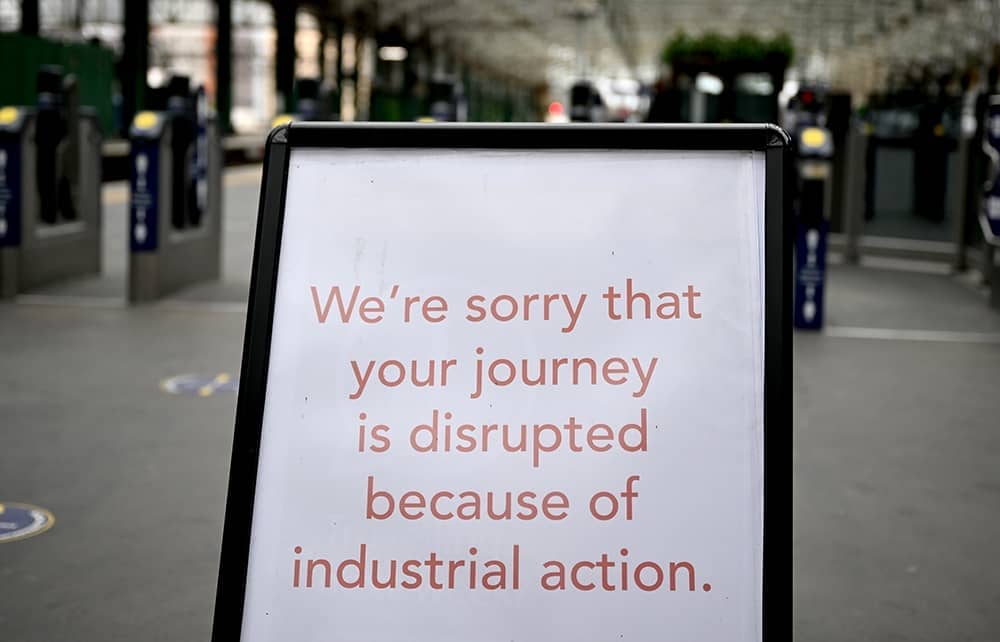Here I go again, in my occasional role as your intrepid transport correspondent. Last week I reported on airport chaos, last month on the opening of the Elizabeth line. Now here I am boldly defying the rail strike on a Grand Central train from York to King’s Cross.
To be honest, on a perfect sunny morning, it feels less stressful than my regular journeys on this crowded and often disrupted line. The RMT pickets at the station entrance were less aggressive than the pigeons on the platform trying to steal a bite of my bacon roll. Grand Central – ultimately owned by German taxpayers, though I don’t suppose that explains why its trains are still running – is maintaining welcome Tannoy silence, while no doubt praying that striking signalmen won’t halt us north of the capital. And the onboard wifi is working better than usual because so few passengers have been brave enough to travel.
But what a bone-headed, uncaring, economically illiterate, Trot-driven, back-to-the-1970s industrial action this is. And what a harbinger of troubles to come as public-sector employers waft 3 per cent offers at unionised workers suffering double-digit inflation. In the private sector, Rolls-Royce’s one-off £2,000 ‘cost-of-living bonus’ for 14,000 staff may become the favoured device for holding percentage rises down. But with unemployment for the time being unnaturally low, the threat that unaffordable wage demands will lead to job losses – either directly as afflicted firms rationalise or automate, or more widely as recession sets in – will be drowned out by calls for ‘fairness’ in the face of food and fuel poverty and rhetoric about ‘rising inequality’.
My train cruised into London almost on time and I’ve just thanked the smiling driver, who agreed with me it was ‘all nice and calm this morning’. But it’s not going to be calm this autumn – and I’m glad my destination isn’t 10 Downing Street, because I’d have no advice to offer on how to handle this crisis for a Prime Minister who will, I predict, finally be brought down by it.
No intrinsic value
Whenever I cast the smallest shadow of doubt on the economic wisdom of Brexit, readers bombard me with ‘Get over it, you old Remainer’, or coarser words to that effect. But when I preach fire like old Dr Paisley about the delusional dangers of crypto-currencies, nary a peep of protest. I can only assume you’re a wiser lot than the 2.3 million Britons who hold crypto assets and have recently been watching them plunge – bitcoin having fallen by two-thirds in six months – while many of the exchanges that purport to deal in them pull down the shutters in panic.
Then again, when I give Bank of England governor Andrew Bailey a kicking for mishandling inflation, readers tend to sidle up and tell me I’ve let him off too lightly. But I think we can all say ‘Hear, hear’ to his latest dictum to the Public Accounts Committee, that crypto has ‘no intrinsic value’ and ‘If you want to invest in these assets, OK, but be prepared to lose all your money’.
First world problems
I’ve been browsing the annual Global Wealth and Lifestyle Report published by the Swiss bank Julius Baer, which analyses living costs for ‘high-net-worth individuals’ in the world’s major cities. London has swapped with Tokyo this year, moving up from eighth position to become the second most expensive citadel of wealth behind Shanghai. Manila and Mexico City are among the more affordable options, but if you’re looking for a compromise between cost, style and personal safety, I’d say Barcelona in 16th place is your best bet.
Intriguing too are the items in the report’s shopping basket that have seen the sharpest rises in price this year, presumably because demand has outpaced supply. In London these include hotel suites up 225 per cent, lawyers’ bills up 50 per cent, and whisky up 31 per cent – conjuring a picture of stressed-out fat cats facing post-lockdown divorces. Still, at least health insurance has got cheaper and I’m pleased to see the well-padded have been spending to get fitter, driving the price of treadmills up by 18 per cent and of high-end bicycles by 34 per cent.
Curious banker
The death of Michel David-Weill, the cigar-puffing billionaire former patriarch of Lazard Frères in New York and Paris, reminded me of a conversation with William Cohan, author of The Last Tycoons (2007), an award-winning ‘secret history’ of the Lazard partnership and the self-styled ‘Great Men’ who once presided over it. ‘Why don’t we just stop writing about these monsters?’ I asked Cohan when we exchanged notes, both of us having left first careers in investment banking to make second ones chronicling its grotesqueries. ‘Aren’t we just playing to their overinflated self-image and encouraging them to behave even worse?’
Cohan – who went on to write books about Bear Stearns and Goldman Sachs – was clearly not persuaded. And in the end I had to agree that we were doubly lucky: to have escaped such an uncongenial milieu but having encountered such ripe characters to write about. Some – including David-Weill’s unspeakable son-in-law Edouard Stern, who died in 2005, clad head-to-foot in latex, at the hands of a gun-toting dominatrix – really were monsters.
But David-Weill himself, so one of his colleagues told me this week, was not in that category at all: he just ‘did what was necessary’ to harness his big-ego partners and keep Lazard at the top of its game. And like all the best bankers he was driven less by money, more by curiosity. ‘He had a quizzical way of looking over his glasses that made you tell him the plain truth however you intended to disguise it’; and ‘if there was an unfamiliar envelope on his desk, he’d rip it open immediately in the hope of something interesting inside’. I suppose lesser financiers might have shredded it unopened, for fear of a regulator’s warning or a final demand.







Comments